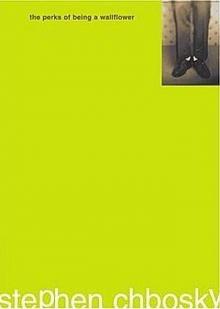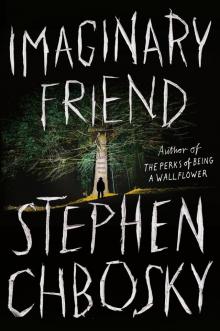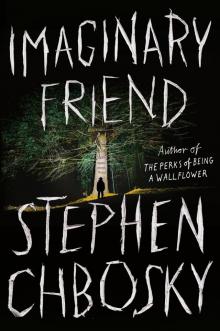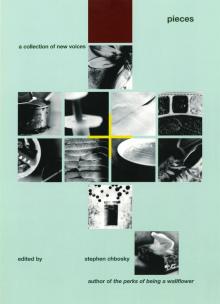- Home
- Stephen Chbosky
Pieces Page 4
Pieces Read online
Page 4
She would think to ask her mother if she had been crying, but then, remembering the discomfort of the summer-flies, would ask if it had rained while she was under the carousel roof. Her mother would smile, nearly laugh, take her hand, and the two of them would walk home. As they walked, she would tell her mother about her day riding, about the jumps her horse managed with ease, about the trees and the flowers she had seen along the way; she would tell her about the music and the lights and how when you got going fast some looked like stars and others looked like fireflies that came so close to your nose you had to be careful not to breathe them in, and still others looked like fairies. She would tell her mother all this and the softness beneath her eyes would harden. And wiping the remaining wetness from her face, her mother would smile and tell her to hurry, pulling her gently, saying they weren’t to get home too late.
On other days, her father took her to see her horse. He wouldn’t sit on a bench like her mother, but would stand beside the carousel platform. He would never smile but would only watch her with a distance to his eyes, looking almost beyond her. After a short time, he would tell her she had enough and that it was time to go home. It was never enough when he said it was; she always wanted to ride more, ride farther, keep riding. Sometimes she thought she wanted to ride forever, and just as this possibility occurred to her, he would take her stiffly by the arm and they would go home together, neither of them smiling.
Other times, when the desire to continue riding overcame her, she would tug against his grip, trying to get back to her horse. His fingers were always too firm. And when she began to cry, he would, without fail, release his fingers and apologize, crouch down, his eyes glassy and red, take her softly in his arms, and tell her that everything was going to be all right, everything, he would tell her, was going to be all right. She never understood what he meant. To her, nothing seemed all right; she was leaving the park, leaving her horse before he had to rest, but she knew it was best to smile, take his hand, and not mention the pain in her arm.
After days like that, she returned home and struggled even harder to keep the figure of the horse firmly placed on the ceiling. She would even try to convince the thin crease of moonlight to dance, and, desperately, she would try to play the carousel song over the wall-noises, but never could. And instead of any of this, instead of the horse or the dancing light or the music, the flies would visit her, and she liked the flies least of all.
The other noises soon became louder, stealing some of the brightness from the now even narrower crease of moonlight and eating more of the music. She slept less, no longer able to find the solace the prospect of morning had once provided her, the prospect of again climbing onto the back of her beautiful boy and riding until all she felt was the rhythmic motion, the wind against her face, tossing her hair with its gentle fingers: the sheer joy and contentment she once found there. But soon, as the noises grew, these feelings lessened and sleep became more difficult; everything she had associated with her horse was slowly being replaced, forgotten.
She cried more often now. She cried because she was unable to enjoy her horse as she once had and she cried because she knew that she could never enjoy it as long as the noises ate the music from her dreams.
Soon the flies stopped, replaced with the rain that softened the skin beneath her mother’s eyes. It was then that she decided.
She sneaked from the dark and dreamless room, through the house, the sounds of her steps swallowed by the noises, and out into the cool autumn night. The moon was only a sliver, a sly grin no wider than the crease that fell each night on the foot of her bed, but it was deeper and free, surrounded by nothing but space. She immediately noticed the freedom the moon had and began to feel sorry for the crease, sorry it was forced to be in the room with her where no dreams could ever live instead of at home in the deep, cool night sky, where, she imagined, dreams could live with ease, flying about without the fear of ever being swallowed. It was unfair, she thought, as she moved through the grass of the front yard, the rubber toes of her sneakers collecting the dew the night had labored to place on each individual blade. The lawn was glazed sublimely and glistened like the surface of a lake at sunrise as the sparse moonlight danced off each drop of condensed night air, but with each step, she unintentionally erased the night’s efforts.
She made her way through the yard quickly and stepped onto the dull and hard asphalt without hesitation and continued, leaving wet prints behind with each step. She was making her way to the carousel.
The park was less than a mile from her house, and, once in the street, she began to walk with urgency. She didn’t know what she was going to do when she got there. She hoped she would see the lights dancing and she hoped she could hear the music at its proper speed, but more than anything else, she wanted to see her horse, her beautiful white stallion.
She walked, and her thoughts were kept from the pain in her heels as they landed on the unyielding asphalt with each heavy step, and were kept from the weariness in her legs and her eyes by the thought of climbing onto his back. Tonight she would ride longer and farther than she ever had before, forever maybe. Tonight would be the night she wouldn’t return, she thought, and she began to run.
Soon she was at the park’s gate. There were no lights, but determined, she proceeded into the darkness, amid which she could hear nothing but the pounding of her own heart, her breath, which had become exaggerated in the much cooler night air, and the crickets that were singing so loudly she thought a few had nested on the lobes of her ears. The carousel was there, standing in front of her, darker than she had ever seen it. She stood a moment, surrounded by the sound of her heart, her breath, and the crickets, staring at the dark, still, and quiet carousel. She couldn’t even make out the colors of the horses and wondered how she would find the white one. Slowly, she moved closer.
The colors became more visible as she neared the carousel, which now, standing just before her, seemed to loom lifelessly in its dark silence. She hesitated, startled by the image, but then she saw him, beautiful and white. He was awake and waiting for her. He knew she would come for him, to free him, she thought. She wouldn’t abandon him the way she had the crease of moonlight, she would help him break free.
She leapt onto the platform, began stroking his mane, and whispered in his ear.
“There’s my boy,” she whispered softly. “There’s my boy.”
Eagerly, she climbed up onto his back and, taking care not to kick him, placed her feet into the gold stirrups, leaned forward, and laid her cheek flush against the black hair of her horse’s head, which was even cooler than the night’s air. She was cold. She hadn’t thought to bring a jacket or a sweater, but her horse would keep her warm, she thought. He would protect her.
She sat with her head resting on his for some time, but it soon became too dark, too quiet, and too cold; they both knew it. She lifted her head and scanned the darkness until she found it: the little red eye, the button. She could see it across the platform, luminously red in the darkness, nestled in a booth behind a wire gate, noticing the keys that hung just beneath it as only a distant shimmer in the night and nothing more.
She dismounted slowly, deliberate with each movement, and wove her way in and around the other horses, who were all sleeping. They were quiet and dreaming, she thought, happy and dreaming in the colors of their coats. That was the difference between her stallion and the rest, and she was going to free him from it all.
She made her way across the platform to the tiny booth that held the eye of the carousel, but the gate was locked. She reached her hand through a gap in the gate, but her arms were too short and the button too far away for her to reach it. She began to cry, but then her eyes caught on something off in the grass. It shone in sharp contrast to the surrounding black, seeming to catch a bit of the night’s light and tossing it in her direction. She ran to it. It was a long silver stick, the kind the man used to poke garbage with. She grabbed it, sprinted back to the platform, and struggled t
o reach the button again.
She tried, but she still couldn’t reach it. Behind her, one of the pink horses was quietly sleeping, and without a moment’s hesitation, she climbed up onto its back. She knew her horse wouldn’t mind her mounting one of the bright ones for the sake of their freedom, but with her feet in the stirrups and sitting in the saddle she was still too short.
Her parents told her repeatedly never to stand on the horses. It was too dangerous, they preached emphatically, she might fall and hurt herself. But they weren’t there, and she knew she couldn’t let her horse remain trapped, like everything was in the room with the noises. No, she wouldn’t let that happen, and using the horse’s head for support, she carefully placed her right foot onto the saddle, followed by her left.
Her sneakers, still wet from the grass, slipped slightly on the horse’s saddle, but she recovered and took a moment to ensure her balance on the animal. Once certain of her footing, she reached the pole between a gap in the gate and, with a hard jab, poked at the red button, missed, steadied herself on the horse’s back, and jabbed again. This time she connected with the button, and, suddenly, the carousel came screaming to life.
The blast of music and light startled the pink horse and it bucked, sending her crashing onto the hard carousel platform. The music was playing and all the horses were awake now and running. It was playing at the right speed and it seemed to completely eat up the sounds of the crickets, her heart, and her breath.
She tried to stand, but her leg hurt and it stung when she tried to move it. Across the platform, she saw her horse running without her. She yelled for it to wait, but it wouldn’t. It kept running and she yelled again, but by now it was galloping away from her. Frantic, she began to drag herself across the platform, between the other horses, and toward her own.
She got to her horse and put her right hand around one of the stirrups, which shimmered like actual gold in the light. She pulled on it, reached up and grabbed the edge of the saddle, and managed, while fighting back tears, to position herself on her horse’s back.
They rode together with the music chasing the crickets from her ears and filling the cavernous night sky. The lights were dancing all around her, above and below, swooping down and up and back. She was surrounded by fireflies that danced and landed on her nose, took off and landed again, and on her eyelashes sat the fairies. She didn’t swat at them like she might a cricket or a summer-fly, no, she let them land wherever they wanted and would let them stay as long as her horse kept running.
They galloped together, and she told her horse about the other noises and how she had escaped but how she had to leave the crease of moonlight behind. Her horse just smiled and galloped along gracefully. She told him how they were going to run forever and never look back and how nothing was ever going to eat the carousel music again. But as they galloped, the music began to disappear, slowly, note by note, it began to fade, replaced by other less-melodic noises. Then a dissonance resembling the wall-noises began to fill her ears, and, from the corner of her eye, she saw two small, round lights off toward the entrance of the park.
As she rode, the lights grew larger and the noises louder and more defined, clearly, now, voices. But she ignored it, put her head down, and whispered to her horse to keep running.
“Don’t stop,” she whispered. “Keep running.”
FIRST SNOW
Davy Rothbart
That fall and on into winter it was a joke among the other five of us on our roadside crew, something we’d say to cement the bonds between one another and keep Maurice safely outside our little circle. Colin, who was in for robbery, and who was, at twenty-three, the oldest of us, and by far the most clever, came up with the catchphrase.
One morning Maurice had said, as we rode in the back of the van on our way to a cleanup site, “Take one step toward Allah and he’ll take two steps toward you.” When he spoke, we could never be sure if he was directing his words at us or talking to himself, so quiet was his voice, his gaze always set off to the side or down at his feet. The rest of us looked around at each other, sneering at this bit of wisdom so early in the day. In us an anger still simmered. Now I know it; it’s the anger of those who have been on the inside for only a couple of months, the anger of incredulity that someone would dare to take you away from your life and put you behind a twenty-foot barbed-wire fence. We were white; we were young; we were angry. Allah was as much our friend as the cops who had taken us in.
For three hours that morning we picked up trash and rehearsed what we knew of proud silences and defiant expressions. Once or twice a car zoomed past with a girl inside, dark hair whipping in the wind, still parading a summer tan in her bikini top even though by then it was late September and cold in Michigan, and we shouted after her and gave chase for a giddy half-second before Greider, the guard, brought us to a stop by raising up his club. We had no doubt that he’d use it. Maurice worked on his own, a little bit away from us.
At noon we ate sandwiches in the back of the van; Greider dozed up front with a newspaper over his face, a curtain of wire mesh and Plexiglas dividing us. I don’t know if Colin had spent the entire morning cooking this up or if he divined it in that moment, but once he’d finished his lunch, he entertained himself by faking sudden hard punches at Maurice. At each feigned blow Maurice flinched and seemed to draw back further into himself; he was so mute and withdrawn it was hard to tell when Colin spoke whether Maurice was ignoring him or simply didn’t hear. “Hey, guys, I got one for you,” Colin said, looking around and gathering his audience the way he always did before delivering a line he knew we would prize. “Check it out, you take one step toward Maurice, he takes two steps away from you.”
We all laughed; maybe I laughed the loudest, I don’t know. The laughter of men on the inside is sad and cruel. Joyous laughter, exuberance, exhilaration; these had no place in our lives at Galloway Lake Detention Center. I’ve been in a lot of other places in the years since and some of them were a lot worse, dangerous, completely devoid of humor in any form; in some prisons I have also seen, on occasion, a bright twinkle in the eyes of some of the older guys that bordered on real merriment, but it was always followed with the same wistful and lost look. Every emotion can basically be experienced in two distinct ways: as felt in freedom, and as felt in shackles. There is happiness behind bars, but it is always chained to something large and immovable. Anger, on the inside, has no place to go. Even loneliness, and grief, and loss, cannot be felt as fully in prison as when you are free.
At least for the five of us, targeting Maurice, laughing at his expense, suspended the monotony of our rage. The little quick breaths that came with our snickering seemed to relieve for a moment the pressure mounting inside us. We spent six mornings and afternoons a week along one sixteen-mile stretch of I-94, roaming the high dry median weeds and the steep marshy embankments, picking up refuse, items so unwanted and vile that highway motorists couldn’t bear to keep them in their cars until they reached a trash can at home. We filled hundreds of blue plastic bags with fast-food wrappers and diapers, pop cans rattling with bees, jagged debris left from highspeed collisions; weeks passed and still the joke had not lost its luster. “Take one step toward Maurice,” Justin or Nick or John Jay might say once we were back in the back of the van with the bags of garbage we’d collected that day, and we’d all crack up before they even finished. Maurice would stare ahead as if he was trying to fade into nothing. Sometimes he’d turn away. The joke gave a rhythm and shape to our days.
Galloway Lake was not really even a prison so much as a small work camp for first- and second-time serious offenders. For me, and for most of us, it was our first time inside, so when the air got colder, and the leaves changed to yellow and orange and red then to brown and at last detached themselves and fell away, and we knew winter was on its way, a certain desperation latched onto our hearts. It’s a peculiar sensation, that first change of seasons when you’re locked up. You begin to understand that while time is frozen for y
ou, it continues on for the rest of the world. Pain constricts your insides. There’s an inescapable heat and ache at your temples. It becomes hard to breathe. I know all of us felt it because our attacks on Maurice came with renewed viciousness and vigor. We never laid a hand on him—Greider’s presence prevented that—but we spat abuse in his face. I remember Nick was the most relentless. Nick told me once that I was. Through it all, I knew that Maurice had been chosen as our victim not only because he was black, and different from us in countless other ways, but because he was the weakest, and weakness, above all things, could not be tolerated. It is no defense, but I offer it as a fact: had I been the weakest, they would have preyed on me.
Maurice, though, Maurice was exceptionally weak. He was just a few inches over five feet, so slight as to resemble a child. He wore big glasses that he cleaned every few minutes by rubbing spit on the thick lenses before drying them with a fold of his pant leg. Some guys retained a quiet dignity in backing away from confrontation. You had the sense that everything you said to them went unnoticed. Maurice, on the other hand, seemed to exist in a state of constant fear and agitation. He trembled at our approach. Insults stung him visibly. The only reason he did not retaliate was because he was so afraid.

 The Perks of Being a Wallflower
The Perks of Being a Wallflower Imaginary Friend (ARC)
Imaginary Friend (ARC) Imaginary Friend
Imaginary Friend Pieces
Pieces